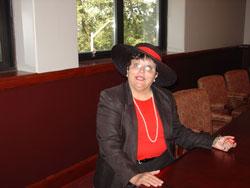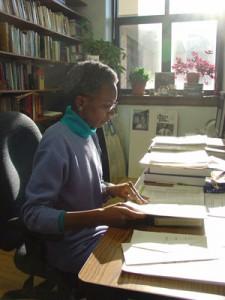The Women's Conference
The Women’s Conference

Carol Crowe Carraco (pictured), who taught the first women’s history course as a special topics class in 1976, came up with the idea for a Women’s Studies Program in the mid-1980s. Women’s studies scholars and activists had begun to establish programs in universities throughout the United States, and Carraco thought WKU could benefit from the diversity women’s studies courses could provide. Ward Hellstrom, who was dean of Potter College at the time, advised Carraco to recruit other interested faculty members to serve on the first women’s studies committee. This group consisted of Lou-Ann Crouther, Doreen Geddes, Karen Tice, Katie Ward, Michael Ann Williams, Retta Poe, and Carol Crowe-Carraco.

(pictured) Phillis Alvic and Betty Powell attended and presented at the women's conference multiple times. Powell, a WKU graduate, is the dean of the college of arts and sciences at Queens College in Charlotte, NC. Alvic, Lexington, is a weaver devoted to crafts and education.
The committee members were eager to initiate a Women’s Studies Program immediately, but they realized that in order for women’s studies to be accepted at WKU, they would have to change the culture of the University because many faculty and administrators did not consider women’s studies a legitimate academic discipline. So in order to demonstrate to the WKU community the intellectual rigor and interdisciplinary nature of women’s studies, they decided to sponsor a women’s studies conference. But first they had to raise money to fund the conference, since they did not receive any direct financial support from the University. Crowe applied for and received a grant from The Kentucky
Foundation for Women, and Geddes contributed the fees from several workshops she conducted.
 Lou-Ann Crouther (pictured), member of the first women's studies conference committee,
is currently an associate professor in the English Department at WKU.
Lou-Ann Crouther (pictured), member of the first women's studies conference committee,
is currently an associate professor in the English Department at WKU.
The theme of the first conference was “Bridging the Gender Gap,” focusing on the disparities in male and female styles of communication. The women who ran the conference “threw their whole heart into it,” said Carraco, and as a result, it was a huge success. From 1988-1995 volunteers continued to staff and secure funding for annual Women’s Studies Conferences. Participants came from throughout the United States and as far away as Belgium, South Africa, and Italy to present their research and to hear such esteemed scholars as Patricia Hill Collins, bell hooks, and Annette Kolodny. Over the years, themes for the conferences varied, but the purpose of the conferences remained constant: to establish women’s studies as a legitimate academic discipline and to enlighten the university community about women’s issues.
Among those not already mentioned who played a leadership role, either chairing the conference or helping out in other ways are:

- Michael Ann Williams (pictured)
- Nancy Baird
- Katherine Green
- Elizabeth Oakes
- Karen Schneider
- Lee Spears
Administrators who support the new women’s studies conference and program include:
- Joe Millichap, early ‘90s head of the English Department
- Elmer Gray (pictured), early ‘90s-2005 dean of Graduate Studies

- Ward Hellstrom, early ‘90s dean of Potter College
Among the faculty teaching the earliest electives are:
- Steve Groce (pictured), the first male professor to offer a gender-related course
(Sociology of Gender)

- Ann Goetting, sociology courses
- Michelle Salisbury, one of the first women’s health courses, followed by Jimmie Price
- Retta Poe (pictured), the first Psychology of Women

Some of the links on this page may require additional software to view.


